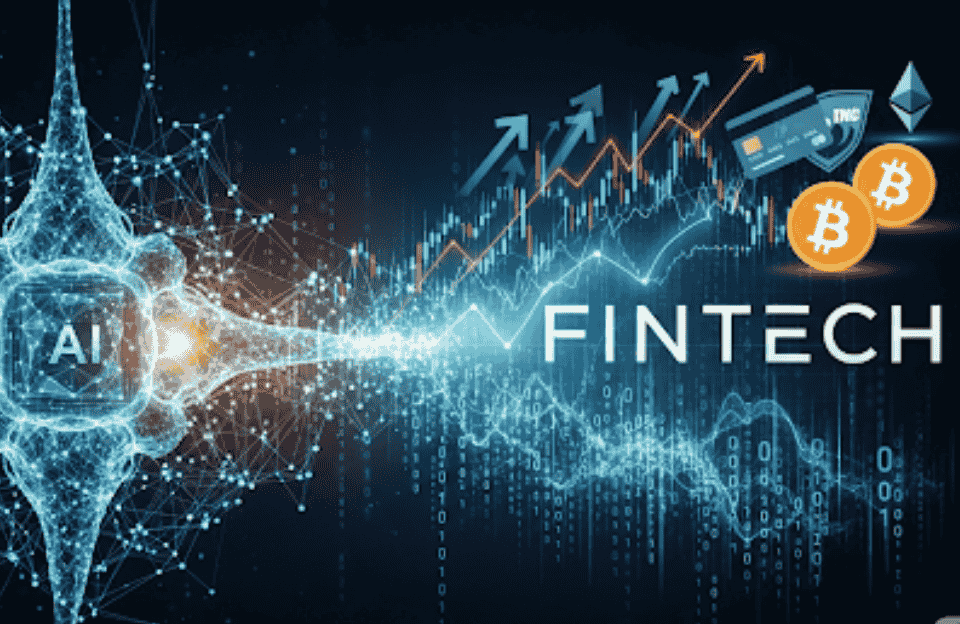The Rise of AI in Fintech
Artificial Intelligence (AI) is no longer a futuristic concept—it’s here, and it’s revolutionizing the financial industry. In 2025, AI in fintech is transforming how banks operate, how customers interact with financial services, and how financial institutions manage risk and compliance. From fraud detection to personalized banking experiences, AI is at the forefront of this transformation.
Key Takeaways
- AI in fintech is transforming the financial industry by enhancing efficiency, security, and customer experience.
- Generative AI is playing a crucial role in automating tasks and improving decision-making processes.
- The AI in fintech market is experiencing rapid growth, indicating a strong future for AI-driven financial services.
- Financial institutions are leveraging AI for various applications, including fraud detection, personalized services, and regulatory compliance.
What is AI in Fintech?
AI in fintech refers to the integration of artificial intelligence technologies into financial services to improve efficiency, accuracy, and customer experience. This includes (source):
- Machine Learning (ML): Algorithms that learn from data to make predictions or decisions.
- Natural Language Processing (NLP): Enables machines to understand and respond to human language.
- Robotic Process Automation (RPA): Automates repetitive tasks to enhance operational efficiency.
These technologies are being applied across various areas in fintech, including:
- Fraud Detection and Prevention
- Customer Service and Chatbots
- Credit Scoring and Risk Assessment
- Regulatory Compliance
- Personalized Financial Advice
How is AI Used in Fintech?
1. Fraud Detection and Prevention
AI algorithms analyze transaction patterns in real-time to detect unusual activities that may indicate fraud. By learning from historical data, these systems can identify potential threats faster and more accurately than traditional methods (Forbes).
2. Personalized Banking Experiences
AI enables banks to offer personalized services by analyzing customer data to understand preferences and behaviors. This allows for tailored product recommendations, customized financial advice, and targeted marketing campaigns (Source).
3. Credit Scoring and Risk Assessment
Traditional credit scoring models often rely on limited data. AI enhances these models by incorporating alternative data sources, such as social media activity and transaction history, to provide a more comprehensive assessment of an individual’s creditworthiness (World Economic Forum).
4. Customer Service Chatbots
AI-powered chatbots provide 24/7 customer support, handling inquiries ranging from account balances to loan applications. These bots can resolve issues quickly, improving customer satisfaction and reducing the workload on human agents (PwC).
5. Regulatory Compliance
AI assists financial institutions in complying with regulations by automating tasks such as transaction monitoring, reporting, and auditing. This reduces the risk of human error and ensures adherence to ever-evolving regulatory requirements (Deloitte).
The Impact of Generative AI in Fintech
Generative AI is a subset of AI that focuses on creating new content, such as text, images, or data, rather than analyzing existing information. In fintech, generative AI is being leveraged for:
- Automated Report Generation: Creating financial reports and summaries without human intervention.
- Synthetic Data Creation: Generating data to train AI models when real data is scarce or sensitive.
- Scenario Simulation: Modeling various financial scenarios to assess potential outcomes and risks.
By enhancing data analysis and decision-making processes, generative AI is helping financial institutions stay ahead in a competitive market (MIT Technology Review).
AI in Fintech Market Growth
The AI in fintech market is experiencing significant growth. According to a report by Straits Research, the global AI in fintech market size was valued at USD 15.4 billion in 2024 and is projected to reach USD 60.63 billion by 2033, growing at a CAGR of 16.45% during the forecast period (2025-2033) (Straits Research).
This growth is driven by factors such as:
- Increasing demand for automation in financial services.
- Rising concerns over cybersecurity and fraud.
- The need for personalized customer experiences.
- Advancements in AI technologies.
FAQs
Q1: What is AI in fintech?
AI in fintech refers to the integration of artificial intelligence technologies into financial services to improve efficiency, accuracy, and customer experience.
Q2: How is AI used in fintech?
AI is used in fintech for fraud detection, personalized banking experiences, credit scoring, customer service chatbots, and regulatory compliance.
Q3: What is generative AI in fintech?
Generative AI in fintech involves using AI to create new content, such as financial reports or synthetic data, to enhance decision-making processes.
Q4: How fast is the AI in fintech market growing?
The AI in fintech market is projected to grow from USD 15.4 billion in 2024 to USD 60.63 billion by 2033, at a CAGR of 16.45% .
Q5: What are the benefits of AI in fintech?
Benefits include improved fraud detection, personalized services, efficient credit scoring, enhanced customer support, and streamlined regulatory compliance.
Conclusion
AI is no longer just a buzzword in fintech; it’s a driving force behind the industry’s evolution. From enhancing security measures to providing personalized banking experiences, AI is reshaping how financial services operate. As we move further into 2025, the integration of AI in fintech will continue to grow, offering new opportunities and challenges for financial institutions and their customers.
Mariam holds an MS in Sociology and brings a sharp, people-centered perspective to her writing. She contributes to multiple websites, covering business, current news, and trending topics with insight and creativity that connects with readers.


